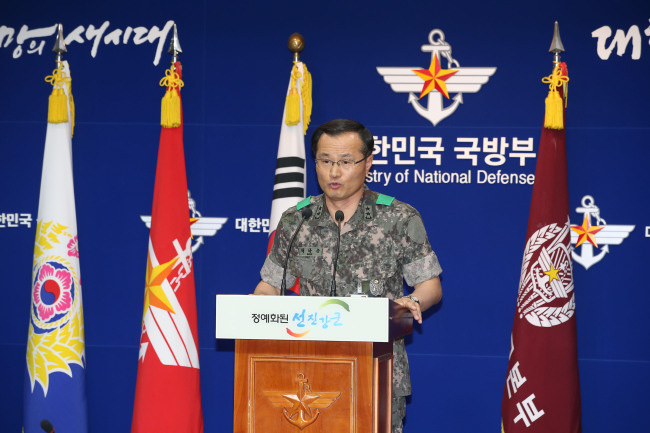Ex-cybercommanders involved in online smear campaign
By Korea HeraldPublished : Aug. 19, 2014 - 21:27
The Ministry of National Defense said Tuesday that its investigators had booked 21 former and current cyberagents including two former cyberwarfare commanders in connection with a high-profile online smear campaign scandal.
Wrapping up its 10-month-long probe into the case, the ministry’s Central Investigation Command spared National Security Office chief Kim Kwan-jin, who served as the defense minister when the scandal erupted, of any charges, saying that he was unaware of the case.
The CIC had led a massive probe into the allegations that cyberwarfare officials posted political comments online to sway public opinion ahead of the 2012 presidential election in breach of their rules on political neutrality. It had questioned some 120 officers and analyzed some 490 computers, 100 tablet PCs and 150 mobile phones during its probe.
“Some of the psychological warfare operatives at the Cyberwarfare Command posted comments mentioning particular political parties and politicians, and the former commanders did not take proper actions with regard to that,” said CIC chief Maj. Gen. Baek Nak-jong during a press conference.
Wrapping up its 10-month-long probe into the case, the ministry’s Central Investigation Command spared National Security Office chief Kim Kwan-jin, who served as the defense minister when the scandal erupted, of any charges, saying that he was unaware of the case.
The CIC had led a massive probe into the allegations that cyberwarfare officials posted political comments online to sway public opinion ahead of the 2012 presidential election in breach of their rules on political neutrality. It had questioned some 120 officers and analyzed some 490 computers, 100 tablet PCs and 150 mobile phones during its probe.
“Some of the psychological warfare operatives at the Cyberwarfare Command posted comments mentioning particular political parties and politicians, and the former commanders did not take proper actions with regard to that,” said CIC chief Maj. Gen. Baek Nak-jong during a press conference.

“Thus, we found that they committed illegal acts of ‘political engagement’ according to the military criminal code.”
The CIC leveled charges of abetting the illegal acts of political engagement against the two former commanders ― Yeon Je-wook and Ok Do-gyeong. The CIC chief said that even though they were briefed about the political online comments, the two failed to make their operatives realize that using political expressions was in violation of the military law.
As it explained in its announcement of the interim investigation result last December, the CIC reiterated that a senior “ultraconservative” officer, surnamed Lee, in charge of psychological warfare encouraged his cyberoperatives to use political expressions during their online activities.
It said that no higher authorities beyond Lee issued any organizational direction for cyberagents to post political comments to influence the presidential election ― an argument that critics say is intended to protect the higher authorities and quickly contain the scandal.
Apart from the two former commanders and Lee, 18 officers were booked on charges including engaging in politics by posting political comments and destroying evidence by deleting the command’s computer servers.
The CIC plans to refer the 21 former and current cyberwarfare officers to the military prosecution soon for indictment.
During the investigation, the CIC found that cyberagents had posted some 787,200 comments online between January 2010 when the command was established, and October last year when the CIC probe began.
Of the postings, 7,100 comments have been classified as illegal political ones that criticized or supported particular political parties or politicians. During the interim investigation announcement, the CIC said there were only 2,100 illegal political comments.
“In the process of the officers carrying out their online activities, a small number of them criticized or backed parties or politicians based on their own political orientations beyond their occupational obligations,” said Baek.
The scandal has seriously damaged public confidence in the Cyberwarfare Command, generating the impression that the command was mobilized to serve domestic political interests, rather than national security.
The Defense Ministry said that it would have the command “reborn as a centerpiece of national security.”
“We express our regret over the scandal that erupted due to some cyberagents,” the ministry said in a press release.
“Currently, we have put in place a panel to ensure the political neutrality of the command under the control of the Joint Chiefs of Staff. We are also conducting an overhaul of the command to make it conscientiously serve its original purposes of cyberwarfare planning, implementation and research.”
By Song Sang-ho (sshluck@heraldcorp.com)
-
Articles by Korea Herald





![[Herald Interview] 'Amid aging population, Korea to invite more young professionals from overseas'](http://res.heraldm.com/phpwas/restmb_idxmake.php?idx=644&simg=/content/image/2024/04/24/20240424050844_0.jpg&u=20240424200058)












![[KH Explains] Korean shipbuilding stocks rally: Real growth or bubble?](http://res.heraldm.com/phpwas/restmb_idxmake.php?idx=652&simg=/content/image/2024/04/25/20240425050656_0.jpg&u=)

